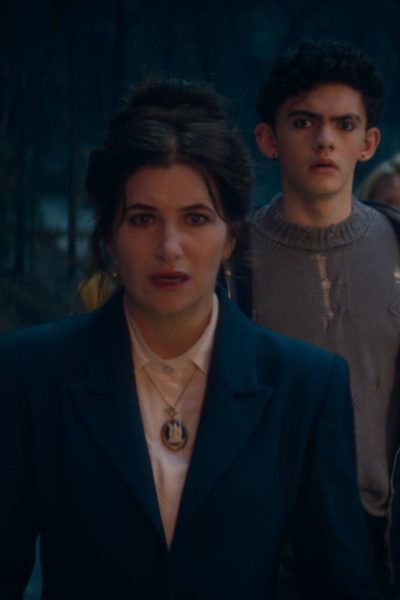
Agatha All Along
Director: Jac Schaeffer (also showrunner); other directors include Rachel Goldberg and Gandja Monteiro
Cast: Kathryn Hahn, Joe Locke, Aubrey Plaza, Patti LuPone, Sasheer Zamata, Ali Ahn, Debra Jo Rupp, Emma Caulfield Ford
“Agatha All Along” begins in the wake of WandaVision, with Agatha Harkness (Kathryn Hahn) freshly liberated from the confines of Westview and stripped of her powers. Drawn into an enigmatic quest by a mysterious gothic Teen (Joe Locke), Agatha embarks on the perilous Witches’ Road—a metaphysical gauntlet of trials promising to restore what she’s lost. Along the way, she forms an unlikely coven with figures both familiar and new—including Aubrey Plaza’s Rio Vidal, Patti LuPone’s oracle, and a host of fan-favorite faces from her past—setting up a journey as much about community and identity as it is about magic.
The tone of the series deftly balances supernatural intrigue, dark humor, and metaphoric peril under the auspicious direction of Jac Schaeffer, Rachel Goldberg, and Gandja Monteiro. From the glint of Agatha’s acerbic wit to the Teen’s brooding earnestness, performances feel grounded, layered, and emotionally resonant. Hahn, in particular, delivers a revelatory turn that anchors the show’s shifting moods with both comedic flair and depth. Supporting cast members—including Plaza and LuPone—add texture and nuance to the ensemble, while return appearances from Debra Jo Rupp and Emma Caulfield Ford reinforce ties to Agatha’s past.
Visually, the series leans into an atmospheric palette—shadows flicker in candlelit chambers, ethereal hues underscore occult experiments, and each trial on the Witches’ Road seems as stylish as it is dangerous, underscored by a haunting score (composed by Christophe Beck and others) and original musical numbers like “The Ballad of the Witches’ Road.”
Under the banner of #AgathaAllAlong (#2024, #ThrillerSeries, #Fantasy), the show navigates themes of power recovery, found family, and transformation, all while embracing queer representation and camp-adjacent genre playfulness. It doesn’t rely on blockbuster spectacle; instead, compelling performances, inventive writing, and production that feels meticulously crafted deliver a show that stands confidently on its own.
“Agatha All Along” begins in the wake of WandaVision, with Agatha Harkness (Kathryn Hahn) freshly liberated from the confines of Westview and stripped of her powers. Drawn into an enigmatic quest by a mysterious gothic Teen (Joe Locke), Agatha embarks on the perilous Witches’ Road—a metaphysical gauntlet of trials promising to restore what she’s lost. Along the way, she forms an unlikely coven with figures both familiar and new—including Aubrey Plaza’s Rio Vidal, Patti LuPone’s oracle, and a host of fan-favorite faces from her past—setting up a journey as much about community and identity as it is about magic.
The tone of the series deftly balances supernatural intrigue, dark humor, and metaphoric peril under the auspicious direction of Jac Schaeffer, Rachel Goldberg, and Gandja Monteiro. From the glint of Agatha’s acerbic wit to the Teen’s brooding earnestness, performances feel grounded, layered, and emotionally resonant. Hahn, in particular, delivers a revelatory turn that anchors the show’s shifting moods with both comedic flair and depth. Supporting cast members—including Plaza and LuPone—add texture and nuance to the ensemble, while return appearances from Debra Jo Rupp and Emma Caulfield Ford reinforce ties to Agatha’s past.
Visually, the series leans into an atmospheric palette—shadows flicker in candlelit chambers, ethereal hues underscore occult experiments, and each trial on the Witches’ Road seems as stylish as it is dangerous, underscored by a haunting score (composed by Christophe Beck and others) and original musical numbers like “The Ballad of the Witches’ Road.”
Under the banner of #AgathaAllAlong (#2024, #ThrillerSeries, #Fantasy), the show navigates themes of power recovery, found family, and transformation, all while embracing queer representation and camp-adjacent genre playfulness. It doesn’t rely on blockbuster spectacle; instead, compelling performances, inventive writing, and production that feels meticulously crafted deliver a show that stands confidently on its own.